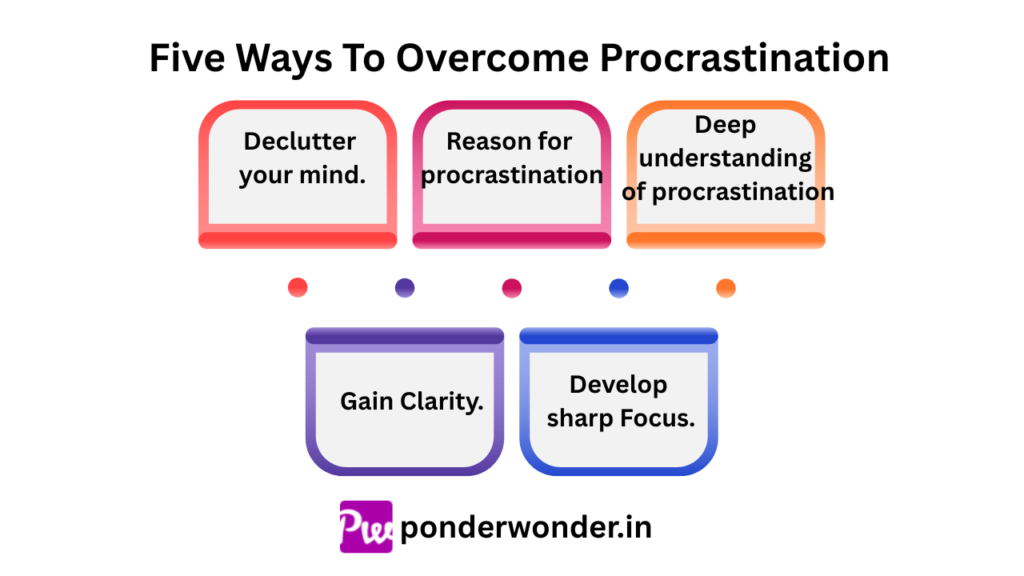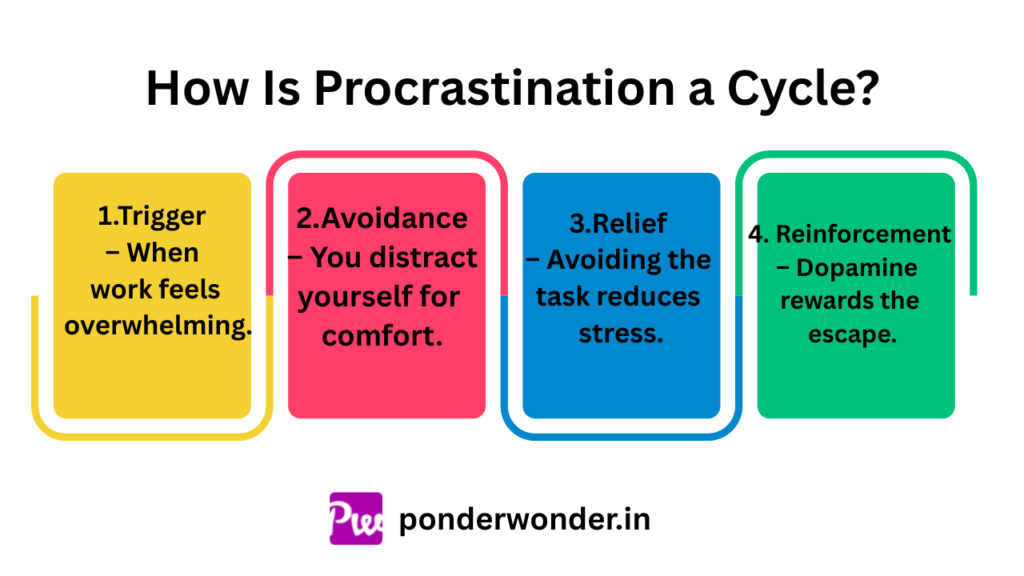
What is Procrastination?
Procrastination is knowing there is a task you should be undertaking, but finding yourself unable to do it.
Thank you for reading this post, don't forget to subscribe!Procrastination leads us to shy away from what we know we should be doing. It steals our future and destroys our potential.
The human brain is wired to prioritize immediate comfort over future rewards. Whenever our brain senses discomfort, it reroutes the person to something safer. This shift happens in the part of the brain called the limbic system. This system is reactive, emotional, and impulsive. The limbic system responds to modern anxieties in the same way it responds to physical danger.
The prefrontal cortex is the CEO. This part of the brain sets goals and makes rational decisions. This part of the brain functions more slowly.
For instance, if there is a fire alarm going off in an office building. While the prefrontal cortex calmly tries to find out the source of the smoke. The limbic system is already screaming, “Get out now.”
When a student’s logical mind tells them to start homework, their emotional brain prioritizes immediate relief. The more he avoids the work, the more his brain rewards him with dopamine. Dopamine is a chemical that produces pleasurable behaviour.
Every time a student avoids a task, he feels a temporary relief and receives dopamine. This habit becomes stronger if he chooses comfort over work.
A Trick that Works
For instance, Ram is a boy who believes that he works better under pressure. The reality is that the night before every deadline, he faces anxiety and hurries to complete the work. Each time he completes a task, his brain rewards him with relief and more dopamine. He was pushing through panic, so when he broke the task into smaller deadlines, it forced his brain to release dopamine earlier. This is how Ram gained control over procrastination.

How is procrastination a cycle?
- Trigger – When work feels overwhelming.
- Avoidance – You distract yourself for comfort.
- Relief – Avoiding the task reduces stress.
- Reinforcement – Dopamine rewards the escape.
What Are the Five Ways To Overcome Procrastination?
- Declutter your mind.
Many of us ask our minds to do a whole heap of work at once.
Our mind doesn’t like thinking about too many things at once. But by decluttering your mind, you can gain clarity and beat procrastination.
- Select a major task and complete it one hundred percent.
- Make a list of unfinished tasks and schedule time for each task.
- Identify the reason for procrastination.
- Being unsure of what we have to do. For instance, over the past few weeks, I was unable to write for two of my new blogs. I was unsure about which niche to write in.
- No sense of urgency was another reason for delaying it. I was unable to include the writing task in my daily routine, and I kept on postponing it for week after week.
- Mental Overload – I realized that I had a mental overload from writing too many blogs in a day. I didn’t know where to get the resources.
So, I made an action guide, wrote all the resources for my blogs and prepared a detailed schedule for it.
- Deepen your understanding of procrastination.
Some of us wait for motivation to do the necessary task. The reality is that motivation doesn’t lead to action; sometimes action leads to motivation. So, the key is to get started. We need to discipline ourselves to do when we should do a task. Often, we start considering our future self as a real identity. We pretend that our future self will do the work tomorrow, next week, or next month for us.
Three things should be considered before we avoid a task:-
- Know why you are procrastinating.
- Understand how motivation works.
- Understand that procrastination comes from flawed thinking.
- Gain Clarity.
Once you are clear about the outcomes of performing your task, you gain clarity. You can gain clarity by doing the following:
- Visualize how good you will feel after the task is completed.
- Just get started, even if you can’t picture the results.
- Search online for hints on how to perform the task.
- Find out the best way to approach the task and figure out concrete steps to take.
- Develop sharp Focus.
When we are in a state of overstimulation, the more you run away from a task, the more you feel the compelling need to distract yourself.
There are some activities that increase your level of stimulation, such as looking at your phone, going on social media, playing video games or watching videos on YouTube. After this, our mind starts playing tricks with us.
For instance, I read first thing in the morning. It gives me a sense of satisfaction. On the other hand, if I go on social media, I might not end up reading for the whole day until night.
Our mind convinces us that excitement is important for yo,u and you need it. But the fact is that excitement can never bring a lasting sense of fulfillment.
Avoid using the internet in the morning and work with wi-fi turned off.
Overall, procrastination can be dealt with wisely, provided we deliberately control our minds so that our actions are directed to perform the task diligently.
Also Read:-
- Why We Celebrate Rakhi | The Story Behind Rakhi | 2025
- How to Build the Best Morning Routine: 5 Powerful Habits for a Healthy Life
- What happens when you become too comfortable being alone?
- Attention Seeking Behavior: How can we differentiate between genuine pain and attention seeking behavior?

Written by Sukhjit Kaur, educator with 17+ years of experience.